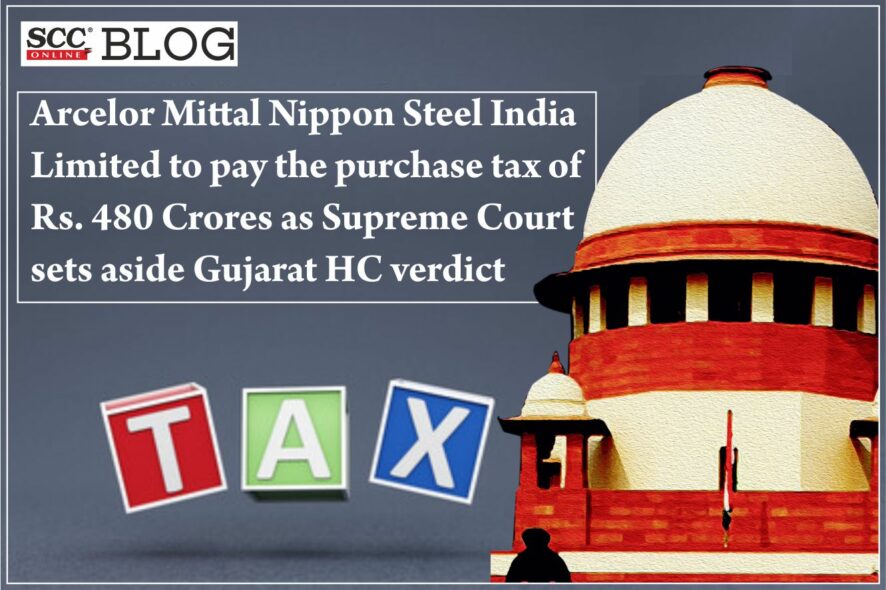Supreme Court: In a major blow to Essar Steel Limited, now Arcelor Mittal Nippon Steel India Limited), the bench of MR Shah* and Sanjiv Khanna, JJ has set aside the Gujarat High Court verdict wherein it was held that Essar was entitled to the exemption from payment of purchase tax as per the Notification dated 05.03.1992, which was issued under Section 49(2) of the Gujarat Sales Tax Act, 1969. As a result Essar will now have to pay the purchase tax of Rs.480.99 crores.
Factual Background
The Government of Gujarat vide Resolution dated 26.07.1991 announced a scheme known as “The Scheme for Special Incentives to Prestigious Units 1990-95 (modified)” for attracting investments in core sector industries. Under the said scheme, a prestigious unit was eligible for incentives up to 90% of the fixed capital investment.
Essar, engaged in the activity of manufacture and sale of Hot Briquetted Iron (HBI) and Hot Rolled Coil (HRC), invested approximately Rs.5000 crores for manufacture of HRC. The said exemption was provided as per Entry 255 of the notification issued by the Government of Gujarat under Section 49(2) of the Act, 1969. The Unit No.2 of the ESL was granted Sales Tax exemption in terms of Entry No.255(2) of the Notification dated 05.03.1992 issued under Section 49(2) of the Act, 1969 for the period from 22.02.1993 to 21.02.2007 up to a maximum monetary limit of Rs. 2050 crores.
This exemption as per Entry No.255(2) vide Notification dated 05.03.1992 was subject to fulfilling following conditions:
- The eligible unit was required to furnish to the selling dealer a certificate in Form No.26 declaring inter alia that the goods are required for use by him/it within the State of Gujarat as raw materials, processing materials or consumable stores in the manufacture of goods for sale within the State of Gujarat or as packing materials in packing of goods so manufactured; and
- The eligible unit shall actually use the goods purchased within the State of Gujarat as raw materials, processing materials or consumable stores in the manufacture of goods for sale within the State of Gujarat or outside the State of Gujarat as packing materials for the packing of the goods so manufactured.
Analysis
Before adverting to the case at hand, the Court explained the scope of interpretation of a taxing statute and observed that the notification has to be read as a whole. If any of the conditions laid down in the notification is not fulfilled, the party is not entitled to the benefit of that notification. An exception and/or an exempting provision in a taxing statute should be construed strictly and it is not open to the court to ignore the conditions prescribed in industrial policy and the exemption notifications.
The exemption notification should be strictly construed and given meaning according to legislative intendment. The Statutory provisions providing for exemption have to be interpreted in the light of the words employed in them and there cannot be any addition or subtraction from the statutory provisions.
In the taxing statute, it is the plain language of the provision that has to be preferred, where language is plain and is capable of determining defined meaning. Strict interpretation to the provision is to be accorded to each case on hand. Purposive interpretation can be given only when there is an ambiguity in the statutory provision or it alleges to absurd results, which is so not found in the present case.
The Supreme Court observed that the Scheme of the Statute does not in any manner indicate that the incentive provided has to continue for the consecutive years irrespective of the fulfilling of the eligibility conditions.
“Applicability of the incentive is directly related to the eligibility and not dehors the same. If it is found that the industrial undertaking does not fulfil the eligibility criteria, it cannot claim the incentive/exemption.”
Hence, Essar, the eligible unit was found not entitled to the exemption from payment of purchase tax under the original Entry No.255(2) dated 05.03.1992, firstly, on the ground that it did not fulfill the eligibility criteria/conditions mentioned in the original Entry No.255(2) dated 05.03.1992 and secondly that there was a breach of declaration in Form No.26 furnished by Essar.
The Court also rejected the contention that as in the earlier assessment years benefit of exemption was granted to the respondent and, therefore, in the subsequent assessment years also, despite the fact that it is found that the respondent was/is not eligible for the benefit of exemption under the original Notification/Entry No.255(2). The Court observed that if such a submission is accepted in that case it will be perpetuating the illegality and granting the benefit of exemption to ‘ineligible industry’, who did not fulfill and/or comply with the eligibility criteria/conditions mentioned in the exemption notification. The principle of promissory estoppel shall not be applicable contrary to the Statute.
“Merely because erroneously and/or on misinterpretation, some benefits in the earlier assessment years were wrongly given, cannot be a ground to continue the wrong and to grant the benefit of exemption though not eligible under the exemption notification.”
[State of Gujarat v. Arcelor Mittal Nippon Steel India Limited, 2022 SCC OnLine SC 76, decided on 21.01.2022]
*Judgment by: Justice MR Shah
Counsels
For State: Senior Advocate Maninder Singh
For Assessee: Senior Advocate Ritin Rai,







